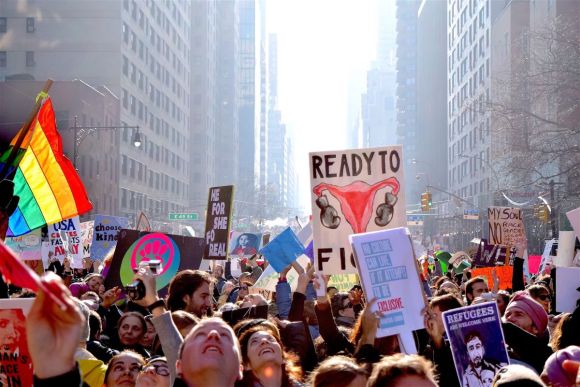
Young women face unique and significant hurdles when it comes to taking part in our democratic system. Currently, not enough is done to support them in pursuing leadership positions. Just as an example, Europe-wide legislation protecting women from online hate speech has not been implemented yet.
By Sofia Strodt, Camilla Egeborg Moeller, Anna-Katharina Ahnefeld (Edited by Marta Silvia Viganò)
Gender differences in the EU: Cyber violence prevents women from entering politics
The fact that gender inequality between men and women in the EU persists is nothing new. However, gender inequalities play out in ways that go beyond glass ceilings and pay gaps. Ursula von der Leyen has adopted a Gender Equality Strategy, but there are still immense legislative shortcomings. For instance, there is no pan-European law about hate speech online, which, in turn, prevents many women from entering politics, as they are the main target of cyber violence.
Though the president of the European Commission is striving for a more equal Europe, there is a long way to go. As MEP Robert Biedron, former mayor of Słupsk in Poland, pointed out during a virtual workshop at the 19th EU Week of Regions and Cities: “We still live in a union of inequality, and hate crimes against women are one of the biggest problems - especially online. That is one of the main reasons why women don’t enter politics. They experience much more cyber violence than their male colleagues.”
Hate speech: The European Commission is working on measures to tackle the problem
According to Biedron, there is an urgent need for a common definition of hate speech. Referring to the famous quote by US politician Madeleine Albright stating that there is a special place in hell for women that don’t help other women, he underlined: “There is a special place in hell for men that don’t help women reaching equality.”
More so, not even a commonly agreed definition of what constitutes hate speech exists as of now. Instead, countries decide independently how they tackle these incidents. To curb these deficiencies, the European Commission is working on measures to improve the situation, aiming to come up with legislation that applies to all member states.
Equal rights across member states: Cultural setting matters
A recent survey by the Assembly of European Regions (AER) has found that 26% of women and 22% of men believe that the situation regarding equal rights and opportunities for women in society and politics is bad or very bad. The survey has also revealed an unexpected finding: survey participants in both Sweden and Poland assess the level of gender equality as adequate and citizens in both countries are satisfied with the current situation.
However, gender equality is an issue that comprises various dimensions, including the cultural setting in which surveys were conducted. In other words: the benchmark for conducting these surveys to inquire about gender equality varies among countries.
Implementing gender-sensitive politics and role models: “Encourage other women”
Councillor Alison Gilliland, Lord Mayor of Dublin, pointed out various barriers that prevent women from thriving in politics. Among other things, these barriers include a lack of cash to fund political campaigns and commitments in terms of childcare. Gilliland stressed that more efforts to promote gender awareness training are needed.
“It is important to encourage other women to join politics. Talk to your local female role models. Feel the fear and do it anyway. You can make a difference,” Gilliland said during the virtual workshop.
Disagreement about gender quota: “The EU has done a lot, but it needs to do more”
Chancellor Andrew Gibson, Vice President for Inclusion, Diversity and Equal Opportunities, believes that a gender quota may alleviate some of the current obstacles. “The EU has done a lot but it needs to do more,” Gibson said. “The current belief system is that society is dominated by old men. We need to change this and have a society that resembles both genders equally.”
Nonetheless, Gibson added that imposing quotas comes with difficulties as well. “Of course you have to find the most qualified people for the job and certain industries are simply male-dominated,” he said.
Alison Gilliland, Lord Mayor of Dublin, slightly disagreed with Gibson, saying she’s a big advocate of quotas. “I believe there are enough qualified women out there, they have just not been put forward enough,” she said.
Equal next EU-Generation? Survey reveals encouraging findings
But the future may look brighter: 43% of those who participated in the AER survey are hoping for - and believing in - a better and more equal next generation of Europe. Christian Spahr, a member of the AER, ended the online workshop on a positive note, stating: “I think it is a very good sign that we are not only discussing problems but also solutions.”



